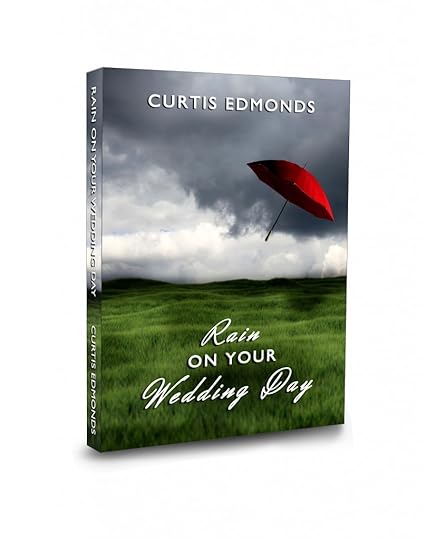Curtis Edmonds's Blog, page 19
December 20, 2013
Rain On Your Wedding Day: Where To Buy

Rain on Your Wedding Day is available for sale at the following outlets for print and electronic books. If I’ve forgotten a specific outlet, let me know and I’ll add it to the list.




KINDLE / MOBI


Smashwords / Download Free Sample
EPUB


Barnes and Noble (Nook) / Download Free Sample




Smashwords / Download Free Sample
OTHER FORMATS

Smashwords (text, PDF) / Download Free Sample
OUTSIDE THE US











December 19, 2013
Rain On Your Wedding Day: Sample Chapter

Chapter One
My daughter Alicia called me once a year on Christmas Day. I would hear from her late in the afternoon when she was driving back from wherever she had spent the holiday. That was the extent of our relationship. There would come a time, I knew, when she would decide not to call me, and that would be the last I would ever hear from her. I didn’t want that to happen this year.
When Alicia called me, I could hear the hum of the asphalt in the background. “Merry Christmas, Daddy,” she said.
“Merry Christmas to you. Where are you calling from?”
I asked, because Alicia moved around a lot. She’d gone to three different colleges and four different master’s programs, and she’d taught at many different campuses in her career. The last time I’d talked to her, some months back, she was teaching sculpture at Rutgers. For all I knew she’d already moved somewhere else.
“We’re driving up I-95 right at the moment,” she said.
I thought about asking who was in the car with her, but stopped myself. “That would put you where, around Trenton?” I asked. Alicia’s mother had moved back to Philadelphia after the divorce. If Alicia spent the holiday with that side of the family, she would be on her way back north toward New Brunswick.
She laughed—her mother’s laugh, short and breathy. “Not that part of I-95. We’re in Georgia, a little ways south of Savannah.”
I was confused for a moment until I figured out a possible explanation. “Are you working at the art college now?” I couldn’t think of another good reason for her to come back home to Georgia.
“Not you too,” Alicia said. “Toby has been teasing me about wanting to move down to Savannah this whole trip. But we’re happy in New Jersey. For now.”
“Oh.” I had no idea who Toby was, but I was glad to hear she was happy.
“Granddaddy has been ill, so Aunt Valerie threw the big Christmas party this year. Her fourth husband has a house on Jekyll Island. You remember Jeff, her son? He and his wife came down from Philly with their three teenaged boys, and they were so impressed that you used to play for the Eagles. They wanted to drive up and meet you in person to get your autograph.”
I felt the old, familiar, horrible chill I always got around my ex-wife’s family. “I don’t think that would be such a good idea,” I said.
“Quit worrying, Daddy. I know you want to be left alone. But I found an old photo of you online. Will Morse, number seventy-seven, in that Kelly-green uniform. I printed it so you could sign it for them.”
“Well, all right,” I said. “Put it in the mail.” It had been thirty years since anyone had wanted my autograph.
“I can do better than that. I can drop it by the cabin. We’re staying in Atlanta tonight, and then we’re driving up to Blue Ridge to see you tomorrow afternoon.”
I hadn’t seen Alicia since the divorce, since I left Atlanta, since I moved up to our old vacation cabin in the North Georgia mountains. That was almost five years ago.
Alicia is my daughter, and I love her. I tried not to let her absence bother me. Whenever she talked to me, it always seemed to bring up bad memories. I didn’t want that for her. I wanted her to be happy. If talking to me made her unhappy, then silence was a price I was willing to pay. It didn’t make sense that she would want to go out of her way to come see me after all this time.
“I don’t want to put you out,” I said.
“Daddy, I came all the way down here. I sat through Christmas with crazy Aunt Valerie. Don’t you dare say no.”
“Of course not,” I said. “I would be glad to see you, sweetie. It’s a little bit of a surprise, that’s all.” I took a sip of hot tea, hoping that it would help steady my voice.
“I know this is short notice. But it’s a good surprise. Trust me.”
“Well, all right then,” I said. “I’ll cook something. What time are you going to be here?”
“Around two, if that works for you?”
“That’s fine,” I said. “You need directions?” I couldn’t remember the last time she’d been to the cabin, and it’s not the easiest place to find.
“Don’t be silly, Daddy. I never get lost. See you tomorrow.”
“See you tomorrow.”
I looked around the cabin, trying to figure out what I could do in the next twenty-four hours to make the place presentable. The living room needed a light dusting, and the small stain on the Navajo rug would come up with a little effort. I had time to get a head start on my laundry. I am not much of a housekeeper, but thirty years of living with my ex-wife had taught me at least to pick up after myself. Cleaning was a way for me to stay busy and to keep my mind from constructing scenarios about why my daughter was coming to visit.
It was late in the evening before I was able to get to a stopping place. I fixed myself the biggest, blackest cup of coffee I could manage. I went out onto the back porch of the cabin and stood on the weathered planks for a long moment. The skyline was gray in the gathering darkness, but I could still see the headlights on the Appalachian Parkway in the valley below. A cold front was making its way south, and a stiff wind was blowing.
The mountain is quiet most days, but the wind gives it a voice. It stirred up the piles of dead brown leaves and rustled through the pine needles. I depend on the calm and the silence of the mountain, and the relentless December wind was an unwelcome intruder.
I breathed the cold air in deep to clear my head. Who was Toby? Why were they in Georgia? Why did Alicia want to see me after all this time? The wind didn’t have any of the answers, not that I expected it to. I didn’t have all that much in the way of answers myself.
I had a wife and four children, but I lost all of them. Danielle and I had one son who died of meningitis in 1979 when he was just a few months old. Alicia had an older sister named Francesca, who died in the fall of 2005 after a car accident. She had a younger sister, Trixie, who died five months later.
I was the only one who was with Trixie when she died. I drove her to the hospital. She whimpered in the backseat the whole way, lost in pain and anguish. Everyone blamed me for her death and they had every right to. No one stood by me then, not Danielle, and not Alicia.
I have lived a long life and have lost most everything I once cherished. I have spent the better part of the last five years alone, in my cabin, a long way from the outside world but far too close to my memories and fears. The loose threads of my relationship with my one surviving daughter were all I had to cling to. If there was any chance at all to bring her back into my life, even for a little while, I wanted to take it, whatever it might cost me.
Rain on Your Wedding Day: What They’re Saying

I have been floored by the warm and generous critical response for Rain on Your Wedding Day. These are some of my favorite reviews.
“Curtis Edmonds did a fantastic job with this book. Well written with characters you want to reach out and hug. The story is heartwarming, tragic but full of love and hope too.” – Have You Heard My Book Review
“Edmonds balances hope and crushed dreams, love and shattered trust, and belief and cynicism on the knife’s edge, producing a beautifully written page-turner.” – IndieReader
“I believe this is the best self-published book I have read this year.” – Ivory Owl Reviews
“Hope. Believe. Love seems to be the message in this contemporary romance. The mystery and unanswered questions even had me doubting Will at one point. For a really sad story I felt the ending was poignant and uplifting.” – Zili In The Sky
“Rain on Your Wedding Day was a fabulous book. Well crafted and a roller coaster of emotion for the reader. I cheered for Will and his family through to the end. If you like literature about the human journey, pick this one up. You will not be disappointed. Edmonds’s first outing is wonderfully impressive and I cannot wait to see where he takes us next.” – Rabid Readers Reviews
“It is beautiful and intelligently written. Flawless in it’s writing and delivery. The characters are potent. Very well developed with a strong, intellectual dialogue. I honestly didn’t know what to expect when I agreed to review this book but I am so very glad I took the chance. This is going to go down as one of my all time greatest most powerful reads. No matter what genre you prefer to read I strongly suggest to give this story a chance.” – Krystal Clear Reviews
“This is a story the makes you feel for Will and root for him till the very end. The author does a brilliant job of writing the story and makes the reader feel for the characters.” – Mrs. Mommy Booknerd
“I absolutely enjoyed this story, the tone, the characters and the size of the story as well. This is Curtis Edmonds’ first novel; let’s hope there are many more to come. – Reign of Error
“Curtis Edmonds has captured in cameo the human condition, with particularity and a sense of time and place, that works, as it always does work, to transcend these particulars and become universal.” – Markham Shaw Pyle, Bapton Books
Read more reviews at Amazon or Goodreads – and don’t forget to write one yourself!
November 28, 2013
What Football Means
I read every single review I can find for RAIN ON YOUR WEDDING DAY. (Which is 99 cents for Black Friday right now at most sites, check it out.) What I don’t often do is respond to reviews, even nice reviews. It’s largely a function of time, and (especially on Goodreads) I don’t want people to think I am creeping on them. Having said that, I write reviews, and it’s always neat to hear back from an author you’ve written a review for, and it’s nicer when you can establish a relationship.
I am making an exception here to respond to a review – this from “Greebs” on Goodreads, who is a friend, despite his irrational advocacy for San Francisco sports teams and my lingering hard feelings over the 1981 NFC title game and the 2010 World Series. He writes:
If I had any complaints, it would be that as a diehard NFL fan, I would have liked a bit more details about that part of Will’s background, and maybe a fuller expansion of his relationship with Dot.
This sort of raises two questions I wanted to answer. (It helps if you have read the book,obviously–if you haven’t, STOP READING THIS, because there are spoilers.)
1. Why is Will an ex-football player, especially if it doesn’t add that much to what we know about the character?
Quite simply, I didn’t have to make Will a football player. He could have just as easily been a lion tamer, or a welder, or a wedding photographer. In a sense, it doesn’t matter what he did, because when the novel starts, he’s retired. He could have been anything.
Obviously, I had to give Will some kind of backstory, and that backstory had to be consistent with the core elements of the character. Here’s a short, non-exclusive list of the things that define the character:
Will is alone, with no close friends and no family, and we learn why this is.
Will is grieving, which means that he had family members once, and they are deceased or otherwise not in contact with him.
Will is divorced, which supports the “alone” part.
Will is a Southerner, which actually casts a wider net than you would think.
Will is in an isolated, rural area, which narrows a lot of the possibilities for the character and what he can do. More importantly, he is there by choice.
Will is rich. He lives in a very nice cabin and has a comfortable retirement (anyway, we never hear him complain about money, even when he has to shell out a lot of it at once).
Will has, in the past, been the subject of intense media notoriety.
Finally, Will is not a rocket scientist. He is a very average person, with a little bit of insight, but he did something incredibly dumb and irresponsible that ruined his life. He’s not a Forrest Gump type, mind you, but he’s not a genius.
So how do you get someone with this kind of background into the position that Will is in at the start of the novel?
I gave Will an NFL career to resolve a lot of the contradictions about the character. Making the character an ex-NFL player sets up or supports some important narratives. First, it explains why Dot is interested in Will. Dot is not interested in Will, at first, just because his daughter is dead or because she thinks Will killed her. Dot is interested in Will because Will’s story received a lot of media coverage and she thinks she can use that to sell books. All things being equal, “Ex-NFL Player Suspected in Daughter’s Death” would get a lot more coverage than “Area Man Suspected in Daughter’s Death,” or even “Circus Acrobat Suspected in Daughter’s Death.” This is true even though Will was a low-round draft choice whose career lasted four years and who was never much more than a backup. The NFL thing gives Will some notoriety, even though he desperately doesn’t want it. Will is essentially dull; the NFL connection makes him interesting.
Second, playing in the NFL sets up the entire course of Will’s life. The NFL gets him out of small-town Alabama. The NFL takes him to Philadelphia, and introduces him to a billionaire’s daughter who becomes his wife. The NFL takes him to Atlanta, and when he can’t play anymore, Will is able to leverage that (and his family connections) into a cushy job at Coca-Cola. Will, I don’t think, is necessarily smart enough to wangle all of this on his own. I think he does a good job at Coca-Cola. but he sort of spends his life in Atlanta coasting on having played for the Falcons. Will is essentially average, but the NFL connection helps explain why he has an above-average retirement.
Third, the NFL connection has important connotations for who Will is and what he does, most of them unstated. Will is a big, imposing guy, who is not always comfortable with himself, and being an ex-lineman is consistent with that. Will is badly scarred mentally, and having scarred knees from playing football lines up with that. Will was an offensive lineman, who protected people, and he failed to protect his daughters. And Will’s life is essentially ruined when his daughter physically overpowers him and takes a knife away from him, and nobody believes his story because he was a big, strong ex-football player.
Fourth, Will lives alone and watches a lot of football. If he’s an ex-NFL player, that makes his interest a little more legitimate than, well, me sitting around all day and watching nine hours of NFL football. The only way the novel works is if Will keeps his dignity all the way through–if he looks weak or pathetic, he instantly becomes that much less likable, which will make people stop reading, which makes me sad. You don’t want me to be sad.
So I, as a novelist, made the choice to put Will in an NFL uniform for all these reasons, and I think they’re pretty solid reasons. I could have made him an oceanographer or a paleontologist or a cop who shot a kid who was waving around a plastic gun, but I didn’t and I love football, so there.
2. So, why isn’t there more detail about Will’s NFL career?
Because I am lazy and didn’t want to do the research.
3. Seriously?
Yeah, pretty much. I write contemporary novels because I read historical novels and understand how difficult that is to do. I am willing to put in a lot of research in what I write, but it needs to be something I can do online, in between commercials for Monday Night Football. I don’t know what it was like to play in the NFL in the early 70′s, especially on cruddy teams that I didn’t follow at that time. Anyway, pretty much anything that happened in 1971 isn’t going to have that much relevance to a story set in 2011.
I think that what football means in the story is this: in football, you have to be strong, you have to be tough, you have to be loyal, and you have to do it over and over again, until it becomes second nature. Will was strong enough and tough enough to play in the NFL, until he wasn’t. He was strong enough and tough enough to be there for his daughter during a rough time, until he wasn’t. But he never stopped being loyal. He couldn’t let his feelings of love and caring and responsibility go. They were second nature to him.
November 20, 2013
It’s Cornbread Dressing Time, Turkeys
Listen up.
We are a little more than a week away from Thanksgiving, and my basic message to you is simple: don’t foul this up. There are so many ways Thanksgiving can go wrong. (I am looking at you, Tony Romo.) You can suffer through unlimited kinds of grief with turkey preparation. You can have lumps in your gravy. You can (God forbid) run out of pie, and that would be so very sad. But there are two things that you absolutely can’t mess up, because if you do, it would ruin everything forever.
The first is simple. Don’t forget the cranberry sauce. Open a jar and put it out and then eat it. I am not even going to be unhappy with you (yes, you, not Tony Romo you but you personally reading this while you should be, you know, working and stuff) if you get the plain cranberry sauce and not the superior whole-berry version, because both are very good in their own way. Having said that, get the whole-berry stuff next time. What is wrong with you? (You here means both you, personally, and Tony Romo.)
The second is the cornbread dressing, and yes, I said CORNBREAD and yes, I said DRESSING. I am not going to argue with you about this. I have spent entirely too much time lately arguing with friends who have the completely wrong and utterly foolish idea that you can put beans in chili and still call it authentic Texas chili, which you cannot do. You can argue about stuff like that if you want, although it is a waste of time and you will still be wrong. But there’s not a word in the English language that conveys the concept of just how unthinkably, tragically wrong it is to eat anything other than cornbread dressing at Thanksgiving. And, yes. It HAS to be CORNBREAD, and it HAS to be DRESSING, and for God’s sake, just listen for a minute while I tell you how to make it and then you will make it and you will understand why it’s so important.
First, the cornbread. Make cornbread. Two loaves, minimum. Get the Jiffy cornbread muffin mix and follow the directions–that’s two boxes per loaf, ideally, unless you have a giant loaf pan, which you probably don’t. So get four boxes–five if you have small children who will eat cornbread but won’t eat dressing. (If you don’t have a loaf pan you can pick up aluminum ones at the store for cheap.) You are going to make your cornbread at least a day before you actually make the dressing, so you won’t be pressed for time later. Got it? Good.
On the day of the feast, take one large onion (Vidalia by preference, but whatever you like is fine) and chop it into bits. Do the same for two stalks of celery. Throw it all into a non-stick pan with, say, half a stick of butter and cook until the vegetables are as done as you would like them to be. While that’s cooking, chop up two pounds of sausage. In an ideal, perfect world, you’d be using Elgin sausage, but you would not go too far wrong using just ordinary kielbasa. If you can get a sage or garlic flavor in your sausage, that’s a nice bonus. If you can grill your sausage, do that, but if you can’t due to weather concerns, just pan-fry it up in your cast-iron skillet until you get a nice little brown crispness to it. Okay? Got it? Good.
Put your cornbread into the vessel of your choice. This can be a shallow aluminum roasting pan, and probably should be, but maybe you don’t have one of those and are too proud to go around the neighborhood offering to rake leaves for a dollar in order to be able to afford one. Pick something that will go into the oven and withstand high heat. If you’re using something you’re going to wash later, then spray the inside of the vessel with Pam before you put anything in there, just in case. Smash up your cornbread or get a small child to do it for you. You want to break the cornbread down to small chunks but not all the way down to crumbs, and you want to spread the crustier bits throughout.
Then take the contents of the veggie pan (with all the butter, yes) and the contents of the sausage pan (with all the rendered fat, yes) and empty them into the cornbread. Use a wooden spoon to stir everything around until the contents are evenly distributed. It will look horrible for a little while, but that’s all right. Don’t worry. Relax. You’re almost done.
What you want to do next is add in sage. If you have fresh sage, and want to pretend that you’re being healthy somehow, that’s cool. I can dig it. I use the dry stuff because I have no such pretenses. Sprinkle the sage liberally over and into the cornbread glop. You can add other seasoning if you want–garlic powder is fine, other herbs like basil and thyme are probably okay, put some salt and pepper in there if you want–but the sage is mandatory.
For the last stage, pour half a cup of chicken stock into the mix and stir. What you are going for, here, is a nice sort of pudding-like consistency. Work the stock into the mixture until everything is nice and moist. If it isn’t moist enough (it probably isn’t), add in more, a little at a time, until everything is nice and wet without being too runny. If you want something a little more custard-y, add in a couple of eggs.
Then put the completed dressing in your oven, at 350 degrees, until the top is all nice and crispy and delicious. Take it out. ENJOY.
You will notice two steps I have not mentioned. First, I never once told you, or anybody, to put the dressing inside the carcass of a turkey, which would make it “stuffing.” THIS IS NOT STUFFING. THIS IS DRESSING. KNOW THE DIFFERENCE.
Second, you will, sometimes, find cornbread dressing recipes that call for the inclusion of white bread. The Paula Deen recipe calls for adding in saltine crackers. THIS IS AN OUTRAGE. White bread is not going to add any flavor to your dressing. White bread is not going to add any useful texture to your dressing. It is just filler. If you need to make more dressing, then make more cornbread. It isn’t hard.
The holidays are difficult times, especially if you have multiple small children who won’t eat turkey or dressing or even cranberry sauce, and are perfectly happy with chicken patties and bowtie noodles for every meal God sends. Don’t make it hard on yourself. Make cornbread dressing and eat as much of it as you can without actually throwing up after the inevitable Tony Romo interception. My God, does he not understand that there’s another team out there in different uniforms?
October 31, 2013
Seven Things I Think About NaNoWriMo
I tried doing National Novel Writing Month (NaNoWriMo) once. It was in November 2001. I was working on a cheap PC in a tiny apartment in Austin, just off Airport Boulevard. I was using the desk my parents bought me when I was twelve.
I didn’t finish that novel for another three years. It never got published. Neither did the next one. The next one got self-published. None of them were NaNoWriMo projects, for the simple reason that it takes me longer than that to write a novel. RAIN ON YOUR WEDDING DAY (which was published in March 2013) was written in two sections, the first half in the summer of 2010 and the second half (after a New Year’s resolution) from January to March 2011. That doesn’t include two years of querying, interspersed with substantial and painful bouts of editing.
I have a very narrow amount of time (from about 10:30 to 11:30 at night, on nights when I’m home) to write anything. That means that my output (which includes blog posts like this one and short stories and making fun of people on Twitter) is, necessarily, narrow. I started my current work-in-progress in (I think) June of this year, and I’ve written only twenty-five thousand words from then to now–more if you count short stories. (This includes two separate vacations where I didn’t write anything except my name on credit card slips.)
Could I ramp up my production, just for November? I mean, sure, I suppose so. I could crank out fifty thousand words, in thirty days, at least in theory. In theory, I could learn to do that thing where you drive your motorcycle off a high ramp and leave your seat while still holding on to the handlebars. In theory, I could think of a better joke than the one where you list all of the silly and impossible things you could do in theory.
Seven things I think about NaNoWriMo:
1. If NaNoWriMo works for you, let it work for you. If it doesn’t work for you, then it doesn’t work and you shouldn’t worry about it. If you want to try it one time and see if it works for you, it doesn’t hurt.
2. NaNoWriMo won’t make you a better writer. Only failure and rejection can do that.
3. NaNoWriMo may make you a more disciplined writer, at least in terms of forcing yourself to sit in your chair and write. But it’s not magic. Like most things involving self-discipline, “it works if you work it.”
4. NaNoWriMo won’t get you published, especially if you’ve never written a novel before. If you don’t understand that, down deep inside, don’t do it.
5. I went to Baylor, and one of the sports team slogans they’ve had at Baylor in the past few years is “pressure makes diamonds.” That’s true as far as it goes. Pressure and heat and time make diamonds. Too much pressure, applied the wrong way, makes coal dust. You don’t want coal dust. If you are like me (God help you) you already put a huge amount of pressure on yourself to succeed with your writing. If all NaNoWriMo is going to do is make you put more pressure on yourself for no good reason, then don’t attempt it.
6. NaNoWriMo is a commitment. There’s nothing wrong with making a commitment, and if you’re able not only to make it but to carry it through, that’s a real positive. But your real commitment is not just to write, not just to finish, but to see the project all the way through until you have your own book in your hands, however that happens. NaNoWriMo is an independent step, not an end in and of itself.
7. This is a graphic showing the covers of thirty NaNoWriMo novels from last year. Ask yourself: have you ever heard of any of these books? Would you buy one, based on the covers? No? Think about why that is, and how you plan on doing better, and what you need to do to make that happen.
October 13, 2013
Punch List
Thank you for the opportunity to look around your home and inspect it for possible defects. I appreciate being of service in this matter, and have attached a brief checklist of items that may cause possible problems.
Kitchen
I spotted some loose trim near the dishwasher, which can be nailed down easily. You also need to think about vacuuming the coils on the back of the refrigerator, which can help with energy efficiency. I checked inside and noticed what appeared to be a small interdimensional portal, although it wasn’t there when I looked again later. You might want to check your warranty and see if it covers that.
Library
I was quite impressed by the size and scope of the books you have collected. I have no idea if they are valuable or not, but they do represent a significant fire hazard and you might want to invest in a fire-suppression system for this room. The bookstand with the open copy of The Necronomicon is a nice touch, but leaving the book open like that can generate ghastly noises of eldritch horror. I can recommend some soundproofing solutions that may alleviate that somewhat.
Bedroom
As you probably already knew, there are quite a few nail pops in the ceiling, which is normal in a house this old. Additionally, the lighting leaves something to be desired. One easy solution is to install some battery-powered LED lamps over the portraits; they last for 10,000 hours and provide just enough ambient light to overcome some of the gloom in there. And I don’t mind telling you, it’s just creepy enough in there that it seems that the eyes in the portraits are following you. I’m sure it’s an optical illusion.
Conservatory
This is more of an organization thing than anything else, but you might want to clean up the clutter in there a bit—I saw a wrench, a lead pipe, rope, and a revolver in there, just lying around. The candlestick looks nice, but everything else should probably be stored more safely.
Jungle Room
You probably already know this, but the big problem here is the humidity—it’s the perfect conditions for growing mold. I know you need it moist in there for all the plants, but I would recommend removing the wallpaper and repainting with a mold-resistant paint. You also need to make sure that the lid on the terrarium is tight enough so that the python can’t escape. There is just one python in that room, right?
Dungeon
The chains that you have in there right now are attached to the wall with drywall screws. There’s a good chance that your captives will be able to pull those right out. You need to make sure that the chains are bolted into the studs. I can send you a YouTube video that shows you how to do it if you want.
Laboratory
It looks like you’ve invested a lot of money on some very expensive equipment, but I’m concerned that the wiring isn’t adequate to support all the amperage you’re drawing down. At a minimum, I would shell out for a surge protector for the corpse reanimation system.
Wine Cellar
The masonry in this room is very nicely done, but there appears to be a very narrow niche in the east wall, just big enough for a person to get trapped in there. You ought to look in to getting that bricked up.
September 17, 2013
Clearing Decks
Once there was a novel. It was a sharp novel, written in sprightly prose, with a likeable narrator and a plot that practically outlined itself. And there was a writer, who was at work on that novel, and managed to get the first draft about a quarter of the way done. Everything was going as it should be.
Then the writer went on vacation. This was a planned vacation. The writer, who conscientiously tracked his writing in a spreadsheet custom-tailored for such a thing, had put space in that spreadsheet for the vacation. If the writer returned from his vacation and started to write once again, at the pace in which he started, then he would finish the first draft by Christmas. He could, theoretically, have a new book for sale as early as Spring 2014. All was well.
So what happened?
I can’t tell you much about the next novel, other than it is not a sequel to RAIN ON YOUR WEDDING DAY. It’s a very different book, more in the way of a contemporary romance. (There is a tiny bit of overlap; people who’ve read the first book will notice a brief reference to the wedding that takes place in the first book, but it’s not material in any way.) The only concrete facts that I can tell you today are these: the book was inspired by the death of the great George Jones, and I have not made any progress on it in the last month.
What happened was rather simple. I was trying to set up a conflict between the main character and a minor character, and I couldn’t figure out how the main character would address it. It was clear that something had to happen, but it was not at all clear why the main character would even consider going along with the minor character’s idea. All of this is relatively unimportant, but it was stumping me and I couldn’t address it. I didn’t want to address it.
What I told myself that I needed to do was to clear decks. So I put the novel away for a couple of weeks and worked on other stuff. A friend had a new book come out, so I read that and wrote a review. I had a good idea for a McSweeney’s piece, and I took the time to write that up, and it didn’t get published because it was just one long joke about Candy Crush Saga. Another friend asked for volunteers to contribute a book review to his blog, so I did that. I had another idea for a McSweeney’s piece, and wrote that and submitted it, and it might even get published, who knows. A publisher sent me a new medieval military novel to read and review, and I started working on that yesterday.
I read about three chapters of the medieval book last night, and tossed and turned for another hour. I got up, took some ibuprofen, turned on the ceiling fan, and got back in bed. I thought for a long minute about the scene I was stuck on in the abandoned novel.
And it became unstuck. Not all the way, of course. And I still have to, you know, write the wretched thing. But it came loose just enough for me to trudge forward tonight, just a few words, and maybe get to the end of the chapter. And who knows, maybe I will get the durned thing finished by the end of the year after all.
I am fond of the phrase “clearing decks,” which means, quite literally, removing all of the sails and ropes and hammocks and dead bodies and what-all so that the big guns of the ship have the space they need to fire and recoil and be loaded again and fire again. I like to think that’s what I’ve been doing, mentally, in the last month – clearing out other responsibilities and ideas out of my brain to make room for more novel-writing. You could call it creative procrastination, if you want.
Well, isn’t it nice to think so?
I am almost always harder on myself than I need to be, but I think that I caused my own problem and had to work out a way to solve it. Before I left on vacation, I had a very disciplined approach, and I worked hard at the novel, and the problems seemed to solve themselves. When I got back from vacation, I’d gotten out of the habit of writing every day and I didn’t have the discipline to start again. Working on all that other stuff was just a way to get my good writing habits back.
I have a window of about an hour a day to write, and that’s it. If I am going to get anything written, at all, I have to be disciplined about it. So far, I haven’t been, not in the way that I would like. Having said that, there’s no rule that says that this book, or any book, has to be done by the spring of next year; I haven’t really hurt myself all that much. But I want to get this accomplished, and there really isn’t another way.
September 5, 2013
It’s Barbecued Pork Ribs Time, Buckaroos
Anyone can cook pork ribs. It’s not all that difficult. The word “barbecue” comes from the practices of aborigines cooking food on Caribbean islands. If those guys, working without the benefit of propane grills or barbecue tongs or even aluminum foil, than you, yes you there, sitting there, reading this, brushing Doritos Loco Taco dust off your fingers, you can bring pork meat to 200 degrees and neglect it for hours. It can be done. I am not saying it can be done well, and certainly it can’t be done all that well by people who have ruined their palates by eating Taco Bell food, but it is possible. Try it! If nothing else, you will have started a fire, and that’s fun. It beats sitting on your bottom reading nonsense that somebody posted on the internet about how to cook ribs the right way.
There is only one right way to cook pork ribs, and that is by applying direct or indirect heat, around 200 degrees or so, for several hours to break down the connective tissues and turn a tough and stringy piece of meat into delicious provender. That is easy enough. If you want to bake your ribs in the oven, you can do that. If you want to cover your ribs in water and put them in a slow-cooker, you can do that. If you want to wrap them in aluminum foil and put them under the hood of your car, you will ruin your ribs and your car, but hey. It’s a free country. As long as you can heat those ribs low enough, and long enough, you should get by just fine.
But will that make them taste good?
Here’s the secret. Pork ribs, in and of themselves, by themselves, don’t taste that great.
Oh, they’re not terrible. There are lots worse things you can eat, like raw red onions or hot dogs with ketchup or what-have-you. But plain, ordinary, unseasoned pork ribs are blah, especially if all you’re doing is cooking them low and slow. That requires flavor. That requires seasoning. That requires you to make some decisions.
YOUR DELICIOUS BARBECUED PORK RIBS RECIPE:
The day before you cook your delicious barbecued pork ribs, you need to…
Yes. The day before. This is a two-day job and you can’t subcontract it out.
Go to the store. Buy your ribs–more than you think you can comfortably eat, because you will want to eat more, because they will taste terrific and you will want them later in the week and for another reason I’ll explain later. If you are almost out of table salt or kosher salt or brown sugar, get all of these things, because you will need them. If your spice rack is depleted, then plete it. Get side dishes if you think you need them, because you are going to be busy having fun tomorrow making pork ribs and won’t have time to make side dishes. Get whatever beverages you would like.
You are not done shopping. You need one more thing. You need either:
A quart of cheap apple cider
A six-pack of really cheap beer
A bottle of two-dollar wine
I am leaving this up to you, because it’s your choice, and it doesn’t matter that much at this point. Get some flavorful, tasty liquid for a low price and then you’re set.
Once you get home–and I mean YOUR home, not MY home, so get the hell out–find a covered vessel of some sort that you can put a cover on and will accommodate your ribs. (I would use my stock pot if it fit in my fridge, but it doesn’t. I used my trusty Le Creuset cast-iron pan the last time I made these ribs.) Get the ribs arranged in there. If you need to, hack the rack of ribs into manageable sections. If you have a macabre imagination with regard to meat and bones and body parts, go to town, you sick creep. If you’re squeamish about such stuff, you can get the ribs at the store that are already hacked up. I won’t tell anybody.
Once the ribs are in their vessel, pour in your cheap liquid and a whole lot of salt, somewhere between a half cup and a cup, depending on how much brine you need. If you are really cheap and used water as your cheap liquid, add a cup of sugar. Make sure all the dry ingredients dissolve. Then cover your vessel, put it in the fridge, and work on making ice cream base if you’re making homemade ice cream.
If you have wood chunks or chips–and you really should–dunk them in water somehow or other – a big bowl, or your utility sink if you have one. Then go do what you would normally do. Or go watch Duck Dynasty reruns. Whatever. I am not going to judge. Go to sleep when it’s time to go to sleep, secure in the knowledge that your ribs are having a wonderful brining experience.
Wake up.
At some point, several hours before you plan on eating, start up the fire on your contraption of choice.
Your contraption of choice should be a smoker. If you’re serious about barbecue, you need one. If you are serious about food in any way, you should have one. If you are poor, save your money and buy one. If you have space limitations or pesky upstairs neighbors who don’t like smoke, move. If you have spousal issues, find a friend who has a smoker, wangle an invitation to come over and eat delicious smoked meats, and tell your wife, “I could make that, too, if I had a smoker.” It may not work, but you can try.
Otherwise – well, do the best you can with what you have. Yes, you can put your ribs on a cookie sheet and put them in the oven. Yes, you can use a charcoal grill if you can keep the fire low enough. Yes, you can use your propane grill if that’s all you have and you have no other options. But you will be missing out on the wood smoke flavor that makes barbecue delicious.
So, anyway. Start your fire. That means lighting the propane grill if you’re doing that, or starting your charcoal in your smoker or your grill if you are doing that, and use lighter fluid because lighter fluid is more democratic and less of a pain to deal with than a chimney starter. Unless you have a blowtorch, then use THAT.
No, I don’t have a blowtorch. Shut up.
Okay. So, here we go, buckaroos. You have, by now, done two of the three things you need to do to make your BBQ ribs flavorful and awesome. You have brined the ribs with salt and sugar and liquid flavor stuff. You have prepared tasty wood smoke to cook them with. That’s two of the three states of matter, so now it’s time to add solid stuff, unless you have plasma on hand, and maybe you should put that down if you do. So take your ribs out of the brine, dry them down a bit, and put them on whatever you’re using to transport them out to your contraption of choice. Now is the time to apply your dry rub, by which I really mean your dry rub, because you have some decisions to make, champ.
There are as many dry rubs as there are people, but there’s basically several ways you can go here, and a lot of that depends on your brine. Think of it a bit like pairing a food with a wine, but not that complicated.
Mexican: If you used cheap Mexican beer in your brine, go with adobo as the basis for your dry rub. Add in cumin or chili powder or cayenne if you want to spice it up a bit. Squirt some lime juice on there, why not.
Asian: If you used a plain brine (or cheap Asian beer, I guess) and want Asian flavors, go nuts. Maybe a very light rub with sesame oil, and then garlic and salt and ginger and sesame, and throw some soy sauce or hoisin or sweet-and-sour on towards the end.
Eurotrash: Pull your ribs out of that wine and apply garlic and pepper and salt. Paprika if you like, I guess, and whatever aromatic herbs you want to use. This is not barbecue, strictly speaking, but it should taste good if you’re in the mood for such a thing.
Buster Poindexter: If you used cheap American beer, offset that by heaping amounts of salt and chili powder and Tabasco and Cajun spice mix and go to town on your tastebuds. Make sure you’re not out of milk.
What I use, and actually recommend, is this. Apple cider brine, and then apply a rub made from three ingredients: kosher salt, brown sugar, and (because I am cheap) the Kirkland mesquite BBQ spice mix that they sell at Costco in half-gallon jugs. That will get you a nice balance of sweet and spicy and will be delicious and isn’t fussy. Rub that stuff all over the ribs, put the ribs in your smoker or contraption of choice, and then (for the most part) leave them alone.
What “for the most part” means is this: If you’re using a smoker, the part of the ribs closest to the firebox will get more heat. Turn the ribs occasionally so one side doesn’t get burned. If you have more than one slab on the smoker, swap places with the other one midway through so they both are evenly cooked. Other than that, don’t mess with them. If you’re using the wood that you soaked earlier, put that in your firebox and let it smoke, and replenish when you need to. Monitor temperature levels but don’t be obsessed with them.
When the ribs have achieved a perfect mahogany color, they are done. Don’t put any more wood or charcoal on. Get your place settings ready, and your carving board, and your side dishes. You are perfectly free to “finish” the ribs on your propane grill if they’re not 100% done or if you want a little more caramelization or if you like burning things for the hell of it.
Now, some people, by which I mean misguided Yankee simpletons, will tell you to slather barbecue sauce on to your ribs as they are cooking. I cannot recommend this, because it is stupid, and because you have spent a lot of time thinking about how you want your ribs to taste and what goes into your dry rub and how the flavors work together, but mostly because it’s stupid. There is not one thing in this world wrong with BBQ sauce, but it belongs on your plate as you are eating your ribs, and not–I can’t even think about it without going all chilly inside. Your ribs will be perfectly fine and delicious without any barbecue sauce, and if that isn’t true then you have done something very wrong in the process.
One brief caveat, though. If you have messed up–if you didn’t brine your ribs, if you didn’t season them, if you have burned them beyond all recognition–then, and only then, can you make amends by pouring out barbecue sauce all over them. But you don’t need to do it, and you shouldn’t.
Finally, and lastly, take a couple of your leftover ribs, and freeze them, and when you make pinto beans in the fall, throw the ribs in the slow cooker to help season the beans. You will thank me for this, later. You will.
August 28, 2013
Your Old E-Mail Pal CDE
I am, right now, about a third of the way through my next book. I am hoping to finish the first draft around Christmas. After that, I’ll need to get it edited and proofread. I would like to have it ready by March 2014 but I make no promises in that. (I am not telling anybody anything about the book except that it’s got a connection to the late, great George Jones, and let’s leave it at that.)
Here’s the thing. I will need to get the word out about that book when it’s published, whenever it’s ready. The easiest way for me to do that is to send out a mass e-mail to a bunch of people.
So I have a question. I don’t think that hardly anyone reads this blog, although I could be wrong about that, but I’d like to find out. If you read this blog, would you sign up for an e-mail list, if I PROMISED that I would ONLY send out e-mails if there was a new book?
I LOATHE the idea of asking people to sign up for an e-mail list, mostly because I am not the kind of person who signs up for e-mail lists. But if, you know, people actually WANT to sign up, who am I to say no? Let me know, in comments here or elsewhere.








